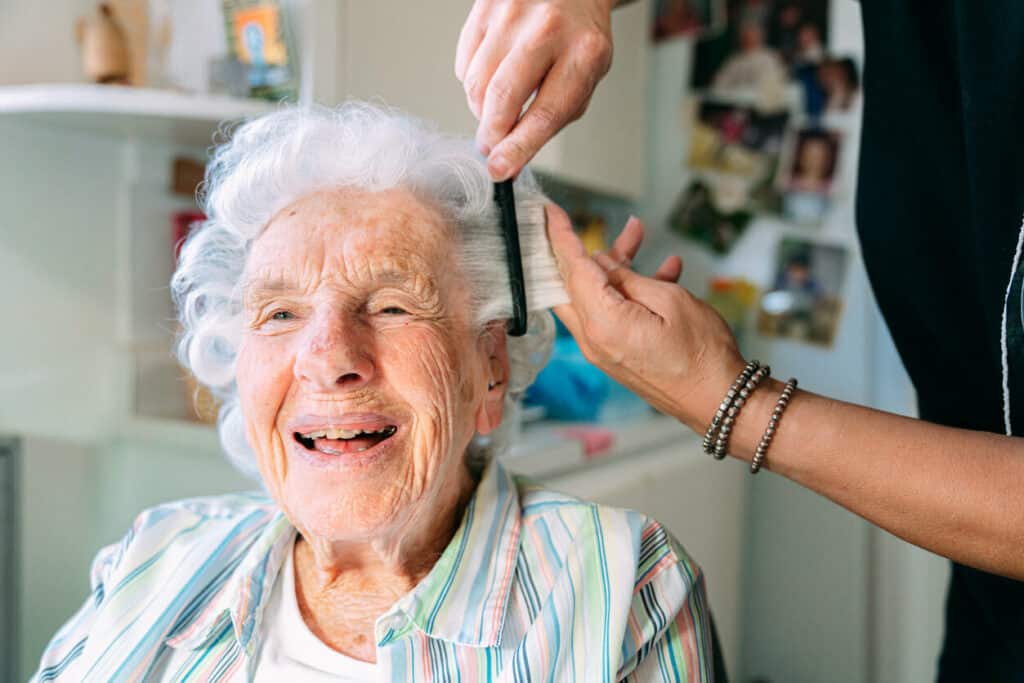What Causes Stress For Caregivers
Caring for an aging parent can be a stressful and demanding experience. There are many reasons why family caregivers may feel stressed. Some could be emotional, others physical, social, or financial.
Emotional Stress
- It can be emotionally challenging to witness your parent losing physical and cognitive abilities to age. When you were a child, you thought they were the smartest, the strongest, and even invincible. This change can result in grief and denial about the physical and cognitive decline and makes adopting the responsibility to care for them harder.

commands as your children do. No one likes to lose their independence, and sometimes this can transform care into an extremely difficult task as you have to balance being respectful and assertive at the same time.
- Another reason for emotional stress could be the lack of clarity on who carries the main responsibility of caring for the aging adult. Who should be the main primary caregiver, and who needs to support occasionally can become an issue between siblings, partners, and spouses. This can turn caregiving into a battle of wills and contribute to elevated stress levels for the caregivers.
- Lack of knowledge on how to deal with certain situations, such as how to care for a loved one who can’t walk or what to do if they experience a seizure or a health emergency, can also be a source of stress.
- The fact that your older parents’ condition most likely won’t improve with time, and will probably worsen, can be hard to swallow. Not losing morale, having patience, and putting on a brave face day after day can take its toll on a person.
Financial Pressure
According to research conducted in the US in October 2021, 54% of adults in their 40s are at the same time financially supporting a 65 or older parent and a child of 18 or younger.
Caring for an older adult could be expensive, especially if they need help with medical bills, transportation expenses, or home modifications. Home modifications for an older adult’s home can range anywhere from $500 to $50,000 or more.
Physical Demands
The physical demands of caring for an aging adult can be significant, especially if they need help bathing, dressing, or eating. Some of the tasks that may be required include:
- Lifting and moving the person
- Assisting with bathing, dressing, and grooming
- Preparing meals and feeding the person
- Managing medications intake
- Providing emotional support
These tasks can be physically demanding, especially if your parent is frail or has multiple health conditions.

In addition to the above, you may also need to provide transportation, manage their finances, and coordinate care with other providers. All these are time and energy-consuming and could leave you stressed, particularly if you have other responsibilities – a job, children, household, etc.
Social Isolation
This doesn’t happen overnight, but over 20% of caregivers report feeling isolated from their friends and family because they are overly busy caring for an older adult.
As mentioned earlier, providing care for someone dependent on you for a lot of their daily activities could be a full-time job, except without the days off, paid leave, or breaks. This can lead to caregiver burnout, which is an issue for you and all your loved ones, who will also be affected by the stress.
Lack of Support
Last but not least on the stress factors list is the lack of support for caregivers. Not receiving enough support from family, friends, or the healthcare system can be because society doesn’t realize how demanding caregiving is or because caregivers don’t ask for it.
How To Recognize You Are Stressed
If you are a caregiver for an aging adult, it is vital to recognize the signs of stress and seek help when needed. Many resources are available to help caregivers, including support groups, respite care, and financial assistance.
As leaders in the senior care sector, we at Amy’s Eden can help you provide the support you and your loved ones need with our elderly care services.
Often, when you are focused on helping others, you forget about your own needs. This doesn’t only affect you, but it also affects the quality of care you provide.

Look for the following 8 most common signs if you aren’t sure that you are experiencing detrimental stress.
- Anger – Do you feel angry or enraged all of a sudden? Does this feeling sneak up on you without notice or a real reason? Do you catch yourself shouting or wanting to yell at your loved ones? Being under pressure can build feelings of anger or resentment towards people around us.
- Anxiety – This can manifest as apprehension to accomplish tasks, to plan for the near or distant future, or as a feeling that you are constantly behind schedule, running out of time, and late for everything.
- Withdrawal – If you feel like you don’t want to participate in activities you used to enjoy or have no desire to socialize or meet with friends and family, you may be depressed due to stress.
- Problems with sleep – The inability to have a good night’s rest is one of the clear indicators of elevated cortisol levels in the blood due to living in a stressful environment. You may encounter difficulties falling asleep or staying asleep during the night, leading to feeling tired or experiencing headaches during the day.
- Fatigue – You may be sleeping well and enough hours, yet if you still feel tired in the morning, this may indicate emotional trauma or stress.
- Loss of concentration – When we feel overwhelmed due to too many tasks and pressured for time, our brains tend to become scattered, and we may experience difficulty concentrating.
- Change of eating or drinking habits – Living under pressure for a prolonged time may cause changes in your daily habits. For example, a lot of people begin craving particular unhealthy food like sweets or chips; others may start drinking alcohol more regularly in an effort to calm themselves down.
- Health issues – chronically elevated cortisol levels during stress can cause a lot of harm to your immune system. After it has been compromised, many other problems may follow. Typically associated with stress are auto-immune disorders such as Crohn’s disease and Hashimoto, as well as headaches, hypertension, depression, and many others.

In addition to the above, you may also need to provide transportation, manage their finances, and coordinate care with other providers. All these are time and energy-consuming and could leave you stressed, particularly if you have other responsibilities – a job, children, household, etc.
Social Isolation
This doesn’t happen overnight, but over 20% of caregivers report feeling isolated from their friends and family because they are overly busy caring for an older adult.
As mentioned earlier, providing care for someone dependent on you for a lot of their daily activities could be a full-time job, except without the days off, paid leave, or breaks. This can lead to caregiver burnout, which is an issue for you and all your loved ones, who will also be affected by the stress.
Lack of Support
Last but not least on the stress factors list is the lack of support for caregivers. Not receiving enough support from family, friends, or the healthcare system can be because society doesn’t realize how demanding caregiving is or because caregivers don’t ask for it.
How To Recognize You Are Stressed
If you are a caregiver for an aging adult, it is vital to recognize the signs of stress and seek help when needed. Many resources are available to help caregivers, including support groups, respite care, and financial assistance.
As leaders in the senior care sector, we at Amy’s Eden can help you provide the support you and your loved ones need with our elderly care services.
Often, when you are focused on helping others, you forget about your own needs. This doesn’t only affect you, but it also affects the quality of care you provide.

Look for the following 8 most common signs if you aren’t sure that you are experiencing detrimental stress.
- Anger – Do you feel angry or enraged all of a sudden? Does this feeling sneak up on you without notice or a real reason? Do you catch yourself shouting or wanting to yell at your loved ones? Being under pressure can build feelings of anger or resentment towards people around us.
- Anxiety – This can manifest as apprehension to accomplish tasks, to plan for the near or distant future, or as a feeling that you are constantly behind schedule, running out of time, and late for everything.
- Withdrawal – If you feel like you don’t want to participate in activities you used to enjoy or have no desire to socialize or meet with friends and family, you may be depressed due to stress.
- Problems with sleep – The inability to have a good night’s rest is one of the clear indicators of elevated cortisol levels in the blood due to living in a stressful environment. You may encounter difficulties falling asleep or staying asleep during the night, leading to feeling tired or experiencing headaches during the day.
- Fatigue – You may be sleeping well and enough hours, yet if you still feel tired in the morning, this may indicate emotional trauma or stress.
- Loss of concentration – When we feel overwhelmed due to too many tasks and pressured for time, our brains tend to become scattered, and we may experience difficulty concentrating.
- Change of eating or drinking habits – Living under pressure for a prolonged time may cause changes in your daily habits. For example, a lot of people begin craving particular unhealthy food like sweets or chips; others may start drinking alcohol more regularly in an effort to calm themselves down.
- Health issues – chronically elevated cortisol levels during stress can cause a lot of harm to your immune system. After it has been compromised, many other problems may follow. Typically associated with stress are auto-immune disorders such as Crohn’s disease and Hashimoto, as well as headaches, hypertension, depression, and many others.
How To Reduce The Stress Of Caring For An Aging Parent
Caregiving can be challenging but rewarding. You are giving back to your loved ones, serving them when they need it, and spending precious time with them. If you learn to manage your stress levels when caring for your aging adult, you will earn the ability to have quality time together. Here are some tips for coping with that.

Seek support
Reach out for help and support from family members, friends, and support groups. Joining a caregiver support group can provide an opportunity to share experiences, seek advice, and find emotional support from others going through similar situations. You will not only learn new things, but you will meet people in similar positions and discover that others love to help if given the opportunity.
Delegate responsibilities
Initially, you may need help from a professional caregiver to assist you in identifying tasks that can be delegated to other family members or hired professionals. Sharing the caregiving responsibilities can reduce your workload and provide some respite. It can also improve the quality of life of your loved one, as they will be able to socialize with a larger circle of people and may benefit from professional help in various ways.
Take breaks and practice self-care
Remind yourself that prioritizing self-care and taking regular breaks means you can accomplish your responsibilities rested, rejuvenated, and in a good mood. Allocate time for activities you enjoy, practice relaxation techniques such as meditation, and maintain a healthy lifestyle with well-balanced nutrition and exercise.
Access community resources
Look around and tap into your local community resources that assist caregivers. This can be in the form of respite care services, adult day centers, or meal delivery programs. These resources can offer temporary relief and support in managing your caregiving responsibilities.
Communicate your needs openly
Practice open communication within the family and encourage them to do the same to ensure everyone understands your challenges. Family members may need to be made aware of your struggle or need for assistance.
Educate yourself
Try to learn as much as possible about your parent’s condition, the available treatments, what to expect from the future, and the best caregiving strategies. Understanding the aging process and any specific health conditions can help you feel more empowered and confident in your role.
Set realistic expectations
Accepting limitations and understanding that you cannot do everything perfectly all the time can help alleviate stress and guilt. Therefore, setting realistic expectations for yourself and your senior beloved is healthier.
Use Respite care
It is a good idea to explore respite care options, such as arranging for a professional caregiver from Amy’s Eden or considering temporary residential care for your aging loved one. Respite care can give you a break from your caregiving duties and allow you to recharge.
Utilize technology
There are many technology solutions that can assist you in your caregiving tasks. Medication reminders, medical alert systems, uber, and video communication platforms can help you keep your loved one safe and connected with healthcare professionals and other family members.

Professional support
Receiving professional support through a trained therapist or counseling services can help you navigate the emotional challenges associated with caregiving and provide coping strategies.
Remember, each caregiver’s situation is unique, and it’s essential to tailor the support and strategies to your specific needs. Encourage open communication and seek ongoing support throughout your caregiving journey. Don’t be afraid to ask for help from family, friends, or professionals.
Do not hesitate to contact us at Amy’s Eden if you’re stressed and need help; we will be happy to assess your situation and come up with a solution that works for you and your loved one.
How To Recognize That Your Parent Needs More Help
Finding peace with the reality that your parents are growing older can take time, but ultimately it is liberating. Their needs, however, may and likely change over time. If you are prepared for these changes and notice their occurrence, you will be able to respond adequately, seek professional help if required, and as a result, provide the best possible care.
Since many changes typically happen over time, recognizing them may be challenging. Here are some of the telltale signs you can look for:
- Your beloved parent’s health or physical abilities are regressing. Perhaps your loved one has suddenly lost a significant amount of weight, their mobility has decreased, or you have noticed unexplained bruises or injuries on them. They may show difficulties with balance or coordination, or their chronic conditions may worsen, leading to increased accidents or falls. All of these can be signs that your parent is having difficulty with mobility or coordination and may need assistance.
- You start to notice cognitive changes such as memory loss, confusion, disorientation, difficulty with decision-making, trouble following conversations, or changes in personality or behavior. All of these could be signs of cognitive decline or dementia.
- Your loved one has started neglecting their hygiene. Notice if they are overlooking personal grooming and hygiene. Are they bathing regularly, wearing dirty clothes, or having body odor? This could suggest they are having trouble managing these tasks by themselves.

- They have difficulty dealing with daily activities and maintaining their home. Your parent struggling with everyday tasks such as cooking, tidying up the clutter, cleaning, or managing household chores. This is an indication they may need assistance to ensure their safety and well-being. Another task they may find challenging is driving. Getting lost, increased traffic offenses, or dents and scratches on the car may indicate that their driving skills have declined and they require alternative transportation options.
- They forget to take their medications. Failing to take their drugs, taking incorrect dosages, or struggling to manage the prescriptions, could be a sign that your aging parent needs help with medication management.
- You have caught they have unpaid bills or financial issues. If you are unsure about this, you should look out for unopened statements, late payment notices, or calls from creditors. Having difficulty managing their finances can b easily overlooked, or it might be embarrassing for your parent to share.

- Your loved one has started to retreat from social activities. Take note if they are becoming increasingly isolated, canceling social engagements, or losing interest in activities they used to enjoy. Social withdrawal can be a sign of declining physical or mental health.
If you observe any of these signs or have concerns about your parent’s well-being, it is imperative to speak openly and honestly with them about their needs. Consider involving healthcare professionals, such as their primary care physician or a professional caregiver, to assess their situation and provide guidance on appropriate care options.
Be Present Today And Prepared For The Future
Caring for an aging adult can be a rewarding experience, but it is essential to manage your stress levels successfully to stay healthy and accomplish your duties as best as possible.
Remember, caregiving is a universal need that almost everyone will require as they get older. We all will have to provide care or will need care one day. The better we are prepared for it, the more effective we can deliver it.
Amy’s Eden can support family caregivers dealing with stress to unwind and recharge, so they can get back to providing quality care.
If you need assistance caring for your elderly loved one, our caregivers are equipped to provide exceptional care. Contact us today to find the ideal caregiver for your loved one.





